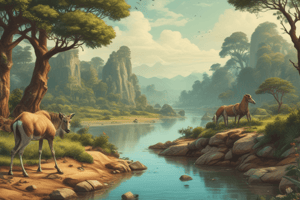Podcast
Questions and Answers
True or false: The exploitation of the natural world as a source of raw materials and a sink for the disposal of waste has rapidly escalated since the middle of the twentieth century.
True or false: The exploitation of the natural world as a source of raw materials and a sink for the disposal of waste has rapidly escalated since the middle of the twentieth century.
True (A)
True or false: The disruption of the global biosphere due to the exploitation of the natural world has only become evident over the past half century?
True or false: The disruption of the global biosphere due to the exploitation of the natural world has only become evident over the past half century?
True (A)
True or false: The commitment to growth without end has wavered despite concepts such as sustainability and 'going green' gaining popularity in recent times.
True or false: The commitment to growth without end has wavered despite concepts such as sustainability and 'going green' gaining popularity in recent times.
False (B)
True of False: Economic growth considered the preferred solution to global inequality after World War II.
True of False: Economic growth considered the preferred solution to global inequality after World War II.
True or False: According to the reading, scientists who exposed ecological problems found themselves under attack from business organizations.
True or False: According to the reading, scientists who exposed ecological problems found themselves under attack from business organizations.
True or False: Large corporations funded the expansion of "think tanks" dedicated to the dissemination of business values and interests that sometimes conflicted with ecological concerns.
True or False: Large corporations funded the expansion of "think tanks" dedicated to the dissemination of business values and interests that sometimes conflicted with ecological concerns.
True or False: The denial of climate change and the attempt to dispute evidence of environmental decline may be described as 'the cultural production of ignorance.'
True or False: The denial of climate change and the attempt to dispute evidence of environmental decline may be described as 'the cultural production of ignorance.'
True or False: Neoliberal economics emerged in the late 16th and early 17th centuries.
True or False: Neoliberal economics emerged in the late 16th and early 17th centuries.
True or False: The authors of 'The Limits to Growth' warned of problems from accelerating industrialization, population growth, malnutrition, resource depletion, and environmental decline.
True or False: The authors of 'The Limits to Growth' warned of problems from accelerating industrialization, population growth, malnutrition, resource depletion, and environmental decline.
True or False: The promotion of "growth" economics was limited to developed countries and not promoted by China and others.
True or False: The promotion of "growth" economics was limited to developed countries and not promoted by China and others.
Flashcards
Natural Resource Exploitation
Natural Resource Exploitation
Since the mid-20th century, using nature for resources and waste disposal has surged.
Biosphere Disruption Timeline
Biosphere Disruption Timeline
The disruption of the biosphere due to the exploitation of the natural world became evident in the last 50 years.
Commitment to endless growth
Commitment to endless growth
Despite 'sustainability' trends, the commitment to endless economic expansion persists.
Post-WWII Economic Growth
Post-WWII Economic Growth
Signup and view all the flashcards
Ecological Problem Opposition
Ecological Problem Opposition
Signup and view all the flashcards
Business-Funded Think Tanks
Business-Funded Think Tanks
Signup and view all the flashcards
Cultural Production of Ignorance
Cultural Production of Ignorance
Signup and view all the flashcards
Neoliberal Economics Timeline
Neoliberal Economics Timeline
Signup and view all the flashcards
'Limits to Growth' Warnings
'Limits to Growth' Warnings
Signup and view all the flashcards
Global Growth Promotion
Global Growth Promotion
Signup and view all the flashcards
Study Notes
- "The Limits to Growth" was written by MIT researchers in 1972 for the Club of Rome, an international think tank.
- The authors, with expertise in various fields, warned of grave problems from accelerating industrialization, population growth, malnutrition, resource depletion, and environmental decline.
- Their modeling showed that continued unchecked economic growth would likely lead to ecological and social collapse in the second half of the 21st century.
- Despite scientists' warnings, economic growth became more entrenched as the primary objective of human societies in the following decades.
- The promotion of growth economics was not limited to developed countries but was emulated by communist China and others.
- Neoliberal economics, which emphasizes the market and limits regulation, emerged in the late 19th and early 20th centuries and was embraced by corporations.
- Neoliberal economics shifted power away from people and their elected representatives to unelected bodies and discarded planning and regulation as inefficient.
- The neoliberal "revolution" in public policy set up roadblocks for regulatory strategies and prioritized the "free market" over the common good.
- The unprecedented economic expansion since the late 1800s coincided with the emergence of modern corporations and the shift from regulation to neoliberal economics.
- The text raises questions about how scientific warnings were ignored and discarded in favor of growth economics, and how corporations and neoliberal economics have influenced public policy.
Studying That Suits You
Use AI to generate personalized quizzes and flashcards to suit your learning preferences.



